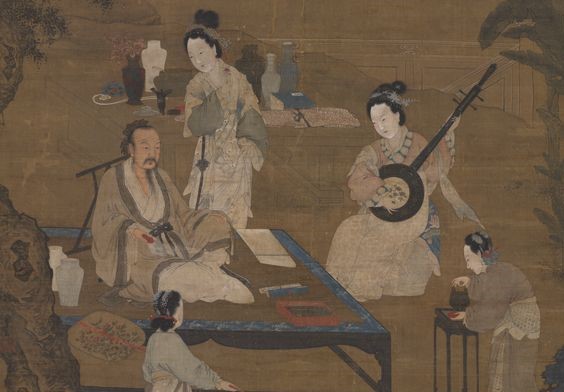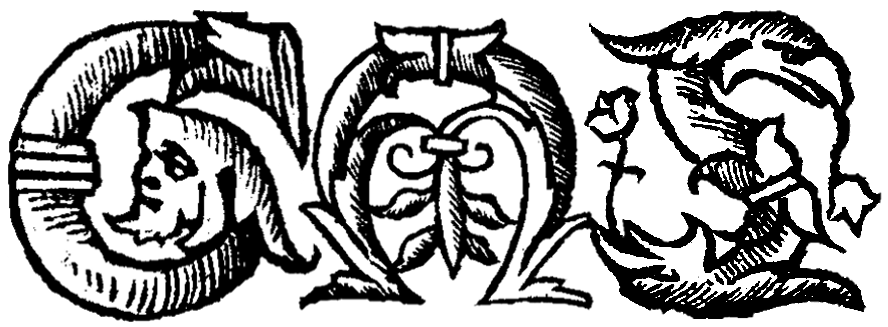To the tune “Partridge in the Sky”—“Your colorful sleeves held the jade cup with affection” | 鷓鴣天 · 彩袖殷勤捧玉鐘

Detail from 宋李嵩聽阮圖軸 (colorful sleeves)", 李嵩, National Palace Museum, Accession Number: K2A000106N000000000PAA [Public Domain]
Read the text (PDF)
Introduction to the Text
This song evokes the speaker’s reunion with a courtesan after a long separation. The first stanza recalls a joyful evening spent together before they parted, followed by the longing which the speaker has experienced ever since. The final lines anticipate an imminent reunion, but one tinged by the sorrowful expectation that it is not likely to be repeated anytime soon.
The ci genre of Chinese poetry first emerged in the Sui dynasty (581-619), was further developed in the Tang dynasty (618-907) and matured in the Northern Song dynasty (960-1127). Ci is usually translated into English as “song lyrics”. This is because ci were composed by poets to fit pre-existing tunes. The number of lines, the line lengths, and the tonal and rhythmic patterns of ci vary with the tunes, which number in the hundreds. One common occasion for composing ci would be a banquet: song lyrics would be scribbled down by guests and then sung by musical performers as entertainment. Other occasions for composing and enjoying ci would be more casual: the poet might sing the lyrics to himself at home or while travelling (many ci poets were civil servants of the Imperial Court and often had to travel great distances to carry out their work). Sometimes the lyrics would be sung by ordinary people in the same way as folk songs. This oral and musical quality sets it apart from other genres of poetry in China during the same period, which were largely written texts with more elevated objectives. There are two main types of ci : wǎnyuē (婉 约, “graceful”) and háofàng (豪放, “bold”). The wǎnyuē subgenre primarily focuses on emotion and many of its lyrics are about courtship and love, while the háofàng subgenre often deals with themes that were considered more profound by contemporary audiences, such as ageing and mortality, or the rewards and disappointments of public service.
Yan Jidao 晏幾道 was the son of the eminent ci poet Yan Shu 晏殊. Together, Yan Jidao and Yan Shu are often referred to as “double Yan,” with Yan Jidao being the “Little Yan 小晏 ” and Yan Shu being the “Big Yan 大晏,” reflecting the fact that during their lifetimes they were both the iconic poets of the wǎnyuē (婉 约, “graceful”) subgenre of ci. Unlike his father, who held a prestigious state position alongside a blooming poetry career, Yan Jidao led a far more arduous life. As the seventh son of Yan Shu, he was born into a noble and wealthy family, and had little interest in officialdom at a young age. His lifestyle was extravagant, filled with luxurious banquets, joyous travels with friends, and beautiful courtesans.
After Yan Shu passed away in Yan Jidao’s late teens, the young man realized the imminent financial difficulties which would befall him and abandoned his previously extravagant lifestyle, devoting himself to a political career. However, he struggled to replicate his father’s success and was framed for his involvement in the movement against Wang Anshi’s New Policies (a series of government reforms), which led to him being jailed. Even though he was quickly released, this incident did huge damage to both his political career and his finances. In his later years, he returned to writing ci, and started compiling a collection of his own works, called Little Mountain Ci (小山 词). In the prologue to this collection, he wrote: “I now think of the ones who once drank with me. Some of them have passed away; others fell prey to illness. I read through my collection as if reliving my past sadnesses, joys, separations and gatherings, which now are like fantasies, or a sudden lighting strike, or a faded dream. Thus I could only cover my pages and mourn, for time slips away too fast, and past joys are illusory and unreal.”
As a poet of the wǎnyuē subgenre, Yan Jidao’s lyrics pay great attention to romantic affairs with courtesans. Compared to his contemporaries, Yan Jidao focuses more on the existential and emotional aspect rather than the physical aspect of these affairs, and incorporates more introspection into his poems. Because of the occurrence of specific names and locations in his ci, some of his ci invite a biographical reading. However, as ci are song lyrics intended for multiple performances by different singers on different occasions, there is also a universal character to the sentiments evoked in Yan Jidao’s ci which transcends the poet’s personal experiences.
About this Edition
The original text of this ci is based on the edition by Tang Guizhang 唐圭璋 ( Quan Song Ci 全宋詞, vol 1. Beijing: Zhonghua shu ju, 1965). Punctuation follows the edition. Since ci poetry rarely includes personal pronouns, and gender-differentiated pronouns did not exist in Classical Chinese of this period, the gender of the speaker as well as their perspective (e.g. first-, second- or third-person) must often be deduced by the translator from context.
Further Reading
Chang, Kang-i Sun. The Evolution of Tz’u Poetry: from Late Tang to Northern Sung. Princeton UP, 1980.
- A standard survey of the early history of Chinese song lyrics (romanized as both ci and tz’u).
Egan, Ronald. “The Song Lyric”. The Cambridge History of Chinese Literature, vol. 1, edited by Stephen Owen, Cambridge UP, 2010, pp. 434-452.
- An overview of the genre.
Owen, Stephen. Just a Song: Chinese Lyrics from the Eleventh and Early Twelfth Centuries. Asia Center, Harvard UP, 2019.
- A recent new history of the genre.
Tang, Guizhang 唐圭璋, editor. Quan Song Ci 全宋詞. Zhonghua shu ju, 1965. 5 vols.
- A comprehensive edition of ci from the Song dynasty and the source text for the ci in this collection (introductions and annotations are in Chinese).
To the tune “Partridge in the Sky”—“Your colorful sleeves held the jade cup with affection” | 鷓鴣天 · 彩袖殷勤捧玉鐘
鷓鴣天
彩袖殷勤捧玉鐘。
當年拼卻醉顏紅。
舞低楊柳樓心月,
歌盡桃花扇底風。
從別後,
憶相逢。
幾回魂夢與君同。
今宵剩把銀缸照,
猶恐相逢是夢中。
To the tune “Partridge in the Sky”
Your colorful sleeves1 held the jade cup with affection;
at that time I cared about nothing else, and I drank until my face was red.
Your dance lowered the moon halfway down behind the willow outside the building;2
your songs exhausted the breeze under the peach blossom fan.3
5 Since we parted,
I have been recalling the day we met.
A few times, I have been reunited with you in a dream.
Tonight, I will keep the silver lamp lit,4
as I fear that [after tonight] I will only be able to see you again in a dream.
Critical Notes
Translation
-
Refers to a courtesan.
-
She danced until the moon was low in the sky, implying that the courtesan danced until dawn.
-
She sings until she is no longer waving the peach blossom fan used for dancing, implying that the courtesan danced until she was tired.
-
The implication here is that the speaker intends to look at the courtesan for as long as he can during the anticipated reunion (hence needing to keep the lamp lit), because he is afraid that afterwards they will be separated for a long time.
